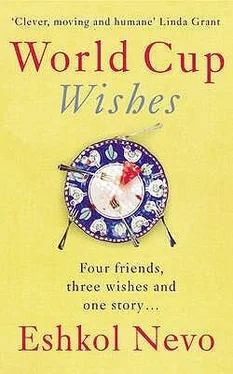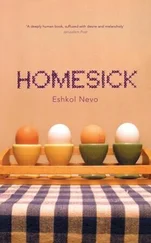*
We just passed Hadera, where are you? Churchill and Ya’ara called from their car the next day.
We just left Michmoret, I said. We’ll probably get there a little after you.
So maybe we should stop at the entrance to Haifa and buy something. What do you bring to a funeral? Churchill asked.
Ofir was sitting in my back seat, very close to Maria, who in the end had decided to come and whose body hadn’t stopped heaving with wracking sobs from the minute she got into the car.
Tell them to buy flowers, he leaned forward and said to me, one of those big round bouquets. And after a long silence, he added, tell me, do you also have the feeling that all the cars on the road are on their way to Ilana’s funeral?
*
Amichai didn’t speak at the funeral. We surrounded him on all sides, except the front, facing the grave. Ofir put his hand on his right shoulder, Churchill on his left, and I supported him from the rear. There were a lot of people at the cypress-studded cemetery near the sea. I only knew a few of them. The weather was strange. Hot and humid. Like in South America. To the left of Ilana’s open grave was one with a headstone in the shape of a guitar, and I thought to myself, that’s good, because Amichai won’t have a problem finding the grave even twenty years from now. My grandfather is buried in the huge cemetery in Holon, and every year when we visit his grave on the anniversary of his death, it takes us hours to find the plot, and last year, my grandmother fainted while we were searching, and the ceremony was cancelled. I’d like to cry now, I thought as the cantor rent the clouds with the El Malei Rachamim prayer, and remembered that Amichai once told me that Ilana had said to him that of all his friends, she liked me best. I never understood why. What I did to make her like me. We’d never had a conversation that lasted longer than five minutes. Perhaps it was that diary I wrote for her five years ago. She was doing research on ‘Depressive Thinking in Everyday Life’ and asked all of us to keep a diary for a week, documenting our most secret thoughts. I don’t have enough men for the sample, she said when she came into the living room carrying instruction sheets. Out of politeness, we each took a sheet, but I was the only one who really wrote in the end. I hadn’t kept a diary since I was ten — that one was written in English and Hebrew by turns to impress the potential reader with my bilingualism — but from the minute I put pen to paper, the words flowed with surprising ease. It was a few months after I came back from my big trip to South America with Churchill and I was still jet-lagged. I still hadn’t wrapped myself in those layers of impassiveness that allow you to reconcile yourself to life’s small compromises. So I wrote about it. And about the oppressive loneliness I always felt even during the warmest moments with the guys. And about the Friday night dinners with my family, when no personal remarks were made even though the atmosphere was very pleasant. And about the fact that — this was before Ya’ara — I had still never really loved a girl. And what was going to become of me?
I also wrote down my smaller thoughts. The stupid ones. Like: how come TV presenters never sneeze on air? Or: how come there’s more water under the sand on the shoreline? And also: does everyone have masturbation fantasies as detailed as mine, or do they make do with general plot lines?
I didn’t hide anything. Not my name either. It didn’t bother me that Ilana would read everything. Perhaps part of me even wanted that.
‘There was something about you that made people want to open up to you,’ one of Ilana’s students eulogised her. She read from a prepared speech, slowly, words carefully chosen, but after that sentence, she suddenly broke apart, like a cloud. She started to cry and couldn’t go on.
Ilana’s older brother spoke after her. He spoke directly to Ilana as if she were still alive, told her that even though he was the older brother, she had always been the one to watch over him, and he begged her to keep watching over him from up above.
Her mother stood up to speak, too. But her resemblance to Ilana was so unnerving — the slim figure, the bob, the nose — that I couldn’t concentrate on what she was saying. Only isolated, broken words reached my ears: mummy’s little girl … you were born out of love … and to love you will return … how … when you were small … why didn’t I say … your soul …
Then there was silence. Some people glanced at Amichai, expecting him to speak as well, but he didn’t open his mouth. Not then and not through the seven days of mourning at Ilana’s parents’ house in Haifa. He sat the whole time on a black plastic chair and stared straight ahead. If someone spoke to him, he didn’t answer. Sometimes he nodded. Usually, he ignored it.
There was something terrifying about his silence. Especially because this was Amichai, the guy gushing with brilliant ideas, the positive thinker. The weirdest dancer in the world, and it didn’t bother him in the slightest. The guy that thirty-year-old men who were healthy as horses bought Telemed subscriptions from just because he inspired their trust.
He’s in shock, Churchill said. His reaction reminds me of the way people on trial react when they’re sentenced to life.
He blames himself, Ofir hypothesised. He was against that operation, remember? Besides, his father died when he was a boy. And he never really had the chance to mourn him. So maybe now …
You don’t understand, Maria interrupted. You never really got along with Lana … So maybe that’s why it’s hard for you to understand … But he loved her. Theirs was a huge, beautiful love. I have never … never in my life seen a man love his wife like that.
Ofir put a hand on Maria’s shoulder. She didn’t move his hand away but she didn’t abandon herself to his touch either.
We hardly saw her during the week of the shiva. Without being asked, she took on the job of taking care of the twins. She talked to them. Explained, as much as it was possible to explain, what had happened. She stroked and hugged and massaged. She dressed and undressed and fed them. She cancelled all her appointments at the clinic and got up every morning at six at Michmoret so she could be in Haifa at seven-fifteen to get the twins organised and take them out for a while, to the beach or the playground or the shopping centre. Because it isn’t healthy for small children to be around black plastic chairs all day.
At first, Ilana’s family didn’t know what to make of all that giving of hers. But Amichai explained to them, his glance piercing, that he thought this was a good solution. And that he wasn’t open to discussion on the subject. So they had no choice but to accept it and explain to curious guests that the large, blonde woman was ‘a good friend of Ilana’s whom the children are very attached to’.
But Ofir wasn’t completely happy with the situation. You don’t have to do it, he told her over and over again. Until one morning, when he tried to persuade her not to take the trip to Haifa that day, to rest a little, see to things at the clinic — she blew up at him. You don’t understand anything, she yelled. You don’t understand anything.
What? What don’t I understand? he asked, alarmed. She had never raised her voice to him.
I want to die, she said in a strange, cold voice. I want to die, Ofi. And the only reason I don’t is the children. They need me, and I’ll stay alive till their father is himself again. After that, I don’t know, do you understand? I don’t know if I want to live.
*
Only twice during the shiva did Amichai come out of his deep, brooding sorrow.
The first time was when Shahar Cohen showed up out of the blue. Shahar Cohen had been one of our group till the army. When he was sent to a military prison for leaving his gun at a hitchhiker’s station, we went to see him, but later he was given a psychiatric discharge and moved to London to study law. At least that’s what his sister, who stayed in Haifa, told us. He himself cut off all contact with us. No letters, no phone calls, no emails. Later, Ofir’s mother told us that she saw him, his hair grown long, playing the harmonica in the Paris metro. But when she talked to him, he acted as if he didn’t know her. Then there were two objective sources that claimed he was a DJ at a party they’d danced at in Amsterdam. On the other hand, there were reports from people who’d been in Budapest and saw him, or someone who looked exactly like him, walk through the gates of the school of veterinary medicine there. On a ship in the Galapagos Islands, Churchill and I met a gorgeous German lesbian. The minute she heard we were from Haifa, she asked if we knew Shahar Cohen. We mumbled that we did, and she told us that he was one of the dominant figures in the Berlin gay and lesbian community, played bass in an Abba covers band, produced cultural events, designed subversive posters. We explained to her that Shahar Cohen is a common name in Israel and the Shahar Cohen we know can’t be gay, because that’s ridiculous … if he was … then we definitely would have sensed something … he was just the opposite … always talking about fucking … fucking girls, we mean. The German girl gave us a supercilious smile of forgiveness that made us shun her for the rest of the journey. But when we came back to Israel, it turned out that Amichai had met someone from high school who knew someone who claimed that Shahar Cohen had been in the country the previous summer and was seen walking hand in hand with an Aryan-looking guy. Just as we were getting used to the sensational news and remembered that, really, we never did understand why there were four different posters of Freddie Mercury hanging in his room, we heard a new story that shook our confidence once again. A former Haifaite, a woman who used to work at the prosecutor’s office with Churchill, went off to the Ramon Crater to be alone and took her dog with her so she wouldn’t feel too alone. After a few hours in the desert sun, the delicate city dog started to convulse and vomit, so she drove in a total panic to Mitzpe Ramon. There she was referred to Dr Luis, the local vet. But the person who opened the door to the clinic was none other than Shahar Cohen, who claimed he didn’t have the slightest idea who Shahar Cohen was, and as proof, pointed to his diploma from the veterinary college in Turin, where the name Ricardo Luis was written in large Latin letters. He treated the dog with outstanding professionalism and revived it. Then he invited both of them to spend the night in his apartment and touched the lawyer’s arm, as if accidentally, when he took her credit card, and mentioned casually the collection of aromatherapy massage oils he kept in his bathroom, and in other words tried to come on to her in a totally heterosexual way.
Читать дальше












